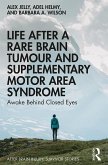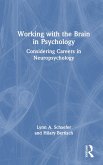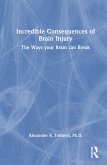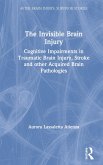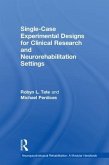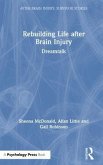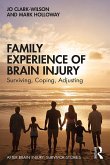Rare Conditions, Diagnostic Challenges, and Controversies in Clinical Neuropsychology
Out of the Ordinary
Herausgeber: Fish, Jessica; Wilson, Barbara A; Betteridge, Shai
Rare Conditions, Diagnostic Challenges, and Controversies in Clinical Neuropsychology
Out of the Ordinary
Herausgeber: Fish, Jessica; Wilson, Barbara A; Betteridge, Shai
- Gebundenes Buch
- Merkliste
- Auf die Merkliste
- Bewerten Bewerten
- Teilen
- Produkt teilen
- Produkterinnerung
- Produkterinnerung
This book highlights those rare, difficult to diagnose or controversial cases in contemporary clinical neuropsychology. By documenting the experiences and learning of clinicians who have worked with cases that are 'out of the ordinary', the book addresses an important gap in the literature.
Andere Kunden interessierten sich auch für
![Life After a Rare Brain Tumour and Supplementary Motor Area Syndrome Life After a Rare Brain Tumour and Supplementary Motor Area Syndrome]() Alex JellyLife After a Rare Brain Tumour and Supplementary Motor Area Syndrome160,99 €
Alex JellyLife After a Rare Brain Tumour and Supplementary Motor Area Syndrome160,99 €![Working with the Brain in Psychology Working with the Brain in Psychology]() Lynn A SchaeferWorking with the Brain in Psychology153,99 €
Lynn A SchaeferWorking with the Brain in Psychology153,99 €![Incredible Consequences of Brain Injury Incredible Consequences of Brain Injury]() Alexander R ToftnessIncredible Consequences of Brain Injury161,99 €
Alexander R ToftnessIncredible Consequences of Brain Injury161,99 €![The Invisible Brain Injury The Invisible Brain Injury]() Aurora Lassaletta AtienzaThe Invisible Brain Injury160,99 €
Aurora Lassaletta AtienzaThe Invisible Brain Injury160,99 €![Single-Case Experimental Designs for Clinical Research and Neurorehabilitation Settings Single-Case Experimental Designs for Clinical Research and Neurorehabilitation Settings]() Robyn TateSingle-Case Experimental Designs for Clinical Research and Neurorehabilitation Settings180,99 €
Robyn TateSingle-Case Experimental Designs for Clinical Research and Neurorehabilitation Settings180,99 €![Rebuilding Life After Brain Injury Rebuilding Life After Brain Injury]() Sheena McDonaldRebuilding Life After Brain Injury161,99 €
Sheena McDonaldRebuilding Life After Brain Injury161,99 €![Family Experience of Brain Injury Family Experience of Brain Injury]() Jo Clark-WilsonFamily Experience of Brain Injury161,99 €
Jo Clark-WilsonFamily Experience of Brain Injury161,99 €-
-
-
This book highlights those rare, difficult to diagnose or controversial cases in contemporary clinical neuropsychology. By documenting the experiences and learning of clinicians who have worked with cases that are 'out of the ordinary', the book addresses an important gap in the literature.
Produktdetails
- Produktdetails
- Verlag: Taylor & Francis
- Seitenzahl: 376
- Erscheinungstermin: 23. Juni 2023
- Englisch
- Abmessung: 234mm x 156mm x 22mm
- Gewicht: 730g
- ISBN-13: 9781032132259
- ISBN-10: 1032132256
- Artikelnr.: 67514905
- Herstellerkennzeichnung
- Libri GmbH
- Europaallee 1
- 36244 Bad Hersfeld
- gpsr@libri.de
- Verlag: Taylor & Francis
- Seitenzahl: 376
- Erscheinungstermin: 23. Juni 2023
- Englisch
- Abmessung: 234mm x 156mm x 22mm
- Gewicht: 730g
- ISBN-13: 9781032132259
- ISBN-10: 1032132256
- Artikelnr.: 67514905
- Herstellerkennzeichnung
- Libri GmbH
- Europaallee 1
- 36244 Bad Hersfeld
- gpsr@libri.de
Dr. Jessica Fish is a clinical psychologist and neuropsychologist. Trained at the universities of Exeter, Cambridge, and King's College London, she is a lecturer and researcher at the University of Glasgow, and works clinically at St George's Hospital, London. Her primary expertise is in acquired brain injury and neuropsychological rehabilitation. Dr. Shai Betteridge is Consultant Clinical Neuropsychologist and Chief Psychological Professions Officer at St George's University Hospitals NHS Foundation Trust, and a founder and director of Allied Neuro Therapy Ltd. Her fields of expertise include neuropsychological rehabilitation, service development, quality improvement and clinical excellence, spanning both public and private sectors. Dr. Barbara Wilson is a world-renowned clinical neuropsychologist. Now retired, Barbara has developed 8 neuropsychological tests, written 32 books, and published more than 300 papers and chapters. Her main contributions are in ecologically valid assessment approaches, cognitive rehabilitation and errorless learning, the holistic model of rehabilitation, and disorders of consciousness.
1. Introduction: Rare Disorders, Diagnostic Conundrums, and Controversies
in Clinical Neuropsychology. Section 1. Rare conditions. 2. Gas Geyser
Syndrome in India: A Tragic, Preventable Neuropsychological Morbidity. 3.
Disconnection syndrome and optic aphasia following left hemisphere
posterior cerebral artery stroke: A deductive assessment approach. 4.
Creutzfeldt-Jakob Disease presenting with Capgras Syndrome. 5. A rare and
challenging differential diagnosis: Prosopagnosia and reduced empathy in
right-variant semantic dementia - where "understanding does not map onto
reality". 6. A life in Portrait mode: Living with Balint's Syndrome. 7.
Exploring the unknown: Shared discovery in rare mitochondrial disease. 8.
Galactosaemia: A rare metabolic disorder associated with 'hidden' deficits
and social vulnerability. 9. Anti N-methyl-D-aspartate receptor antibody
encephalitis: post-acute neuropsychological consequences and rehabilitation
in adolescence. Section 2. Diagnostic Challenges. 10. Neuropsychological,
Neuropsychiatric and Functional Neurological Symptoms: The Challenges of
Overlapping and Evolving Presentations. 11. Factitious Disorder after
severe head injury. 12. Deafness or brain injury? Diagnostic overshadowing
in a deaf person with bilateral temporal lobe damage and visual agnosia.
13. Aerotoxic Syndrome: Are passengers and aircrew breathing toxic cabin
air? 14. Focal Anterograde Amnesia: An Extraordinary Case. 15. "Ugly
sound": An examination of acquired receptive amusia in a skilled music
critic. 16. Variability & Validity: Challenges to Meaningful
Neuropsychological Assessment in Mental Health Settings. 17. Recognising
Autism Spectrum Disorder in Adult Neuropsychology Services. 18. What's in
the diagnosis of 'ASD' in the context of Paediatric ABI? Section 3.
Controversial issues. 19. The dilemmas surrounding the decision to reject
or accept a postgraduate research student with known cognitive difficulties
and a history of an arteriovenous malformation several years prior. 20.
Mild Traumatic Brain Injury: Diagnostic Difficulties and Legal
Controversies. 21. Does this man have or not have mental capacity to make
decisions about his discharge from hospital? 22. The importance of accuracy
when diagnosing Locked-in-syndrome (LIS). 23. Ethical and practical issues
for the psychologist working with patients with a disorder of
consciousness. 24. Losing memories overnight: A unique form of human
amnesia or life imitating art? Conclusion. 25. Learning from Experience:
How can we best help people with rare, difficult to diagnose, or
controversial conditions?
in Clinical Neuropsychology. Section 1. Rare conditions. 2. Gas Geyser
Syndrome in India: A Tragic, Preventable Neuropsychological Morbidity. 3.
Disconnection syndrome and optic aphasia following left hemisphere
posterior cerebral artery stroke: A deductive assessment approach. 4.
Creutzfeldt-Jakob Disease presenting with Capgras Syndrome. 5. A rare and
challenging differential diagnosis: Prosopagnosia and reduced empathy in
right-variant semantic dementia - where "understanding does not map onto
reality". 6. A life in Portrait mode: Living with Balint's Syndrome. 7.
Exploring the unknown: Shared discovery in rare mitochondrial disease. 8.
Galactosaemia: A rare metabolic disorder associated with 'hidden' deficits
and social vulnerability. 9. Anti N-methyl-D-aspartate receptor antibody
encephalitis: post-acute neuropsychological consequences and rehabilitation
in adolescence. Section 2. Diagnostic Challenges. 10. Neuropsychological,
Neuropsychiatric and Functional Neurological Symptoms: The Challenges of
Overlapping and Evolving Presentations. 11. Factitious Disorder after
severe head injury. 12. Deafness or brain injury? Diagnostic overshadowing
in a deaf person with bilateral temporal lobe damage and visual agnosia.
13. Aerotoxic Syndrome: Are passengers and aircrew breathing toxic cabin
air? 14. Focal Anterograde Amnesia: An Extraordinary Case. 15. "Ugly
sound": An examination of acquired receptive amusia in a skilled music
critic. 16. Variability & Validity: Challenges to Meaningful
Neuropsychological Assessment in Mental Health Settings. 17. Recognising
Autism Spectrum Disorder in Adult Neuropsychology Services. 18. What's in
the diagnosis of 'ASD' in the context of Paediatric ABI? Section 3.
Controversial issues. 19. The dilemmas surrounding the decision to reject
or accept a postgraduate research student with known cognitive difficulties
and a history of an arteriovenous malformation several years prior. 20.
Mild Traumatic Brain Injury: Diagnostic Difficulties and Legal
Controversies. 21. Does this man have or not have mental capacity to make
decisions about his discharge from hospital? 22. The importance of accuracy
when diagnosing Locked-in-syndrome (LIS). 23. Ethical and practical issues
for the psychologist working with patients with a disorder of
consciousness. 24. Losing memories overnight: A unique form of human
amnesia or life imitating art? Conclusion. 25. Learning from Experience:
How can we best help people with rare, difficult to diagnose, or
controversial conditions?
1. Introduction: Rare Disorders, Diagnostic Conundrums, and Controversies
in Clinical Neuropsychology. Section 1. Rare conditions. 2. Gas Geyser
Syndrome in India: A Tragic, Preventable Neuropsychological Morbidity. 3.
Disconnection syndrome and optic aphasia following left hemisphere
posterior cerebral artery stroke: A deductive assessment approach. 4.
Creutzfeldt-Jakob Disease presenting with Capgras Syndrome. 5. A rare and
challenging differential diagnosis: Prosopagnosia and reduced empathy in
right-variant semantic dementia - where "understanding does not map onto
reality". 6. A life in Portrait mode: Living with Balint's Syndrome. 7.
Exploring the unknown: Shared discovery in rare mitochondrial disease. 8.
Galactosaemia: A rare metabolic disorder associated with 'hidden' deficits
and social vulnerability. 9. Anti N-methyl-D-aspartate receptor antibody
encephalitis: post-acute neuropsychological consequences and rehabilitation
in adolescence. Section 2. Diagnostic Challenges. 10. Neuropsychological,
Neuropsychiatric and Functional Neurological Symptoms: The Challenges of
Overlapping and Evolving Presentations. 11. Factitious Disorder after
severe head injury. 12. Deafness or brain injury? Diagnostic overshadowing
in a deaf person with bilateral temporal lobe damage and visual agnosia.
13. Aerotoxic Syndrome: Are passengers and aircrew breathing toxic cabin
air? 14. Focal Anterograde Amnesia: An Extraordinary Case. 15. "Ugly
sound": An examination of acquired receptive amusia in a skilled music
critic. 16. Variability & Validity: Challenges to Meaningful
Neuropsychological Assessment in Mental Health Settings. 17. Recognising
Autism Spectrum Disorder in Adult Neuropsychology Services. 18. What's in
the diagnosis of 'ASD' in the context of Paediatric ABI? Section 3.
Controversial issues. 19. The dilemmas surrounding the decision to reject
or accept a postgraduate research student with known cognitive difficulties
and a history of an arteriovenous malformation several years prior. 20.
Mild Traumatic Brain Injury: Diagnostic Difficulties and Legal
Controversies. 21. Does this man have or not have mental capacity to make
decisions about his discharge from hospital? 22. The importance of accuracy
when diagnosing Locked-in-syndrome (LIS). 23. Ethical and practical issues
for the psychologist working with patients with a disorder of
consciousness. 24. Losing memories overnight: A unique form of human
amnesia or life imitating art? Conclusion. 25. Learning from Experience:
How can we best help people with rare, difficult to diagnose, or
controversial conditions?
in Clinical Neuropsychology. Section 1. Rare conditions. 2. Gas Geyser
Syndrome in India: A Tragic, Preventable Neuropsychological Morbidity. 3.
Disconnection syndrome and optic aphasia following left hemisphere
posterior cerebral artery stroke: A deductive assessment approach. 4.
Creutzfeldt-Jakob Disease presenting with Capgras Syndrome. 5. A rare and
challenging differential diagnosis: Prosopagnosia and reduced empathy in
right-variant semantic dementia - where "understanding does not map onto
reality". 6. A life in Portrait mode: Living with Balint's Syndrome. 7.
Exploring the unknown: Shared discovery in rare mitochondrial disease. 8.
Galactosaemia: A rare metabolic disorder associated with 'hidden' deficits
and social vulnerability. 9. Anti N-methyl-D-aspartate receptor antibody
encephalitis: post-acute neuropsychological consequences and rehabilitation
in adolescence. Section 2. Diagnostic Challenges. 10. Neuropsychological,
Neuropsychiatric and Functional Neurological Symptoms: The Challenges of
Overlapping and Evolving Presentations. 11. Factitious Disorder after
severe head injury. 12. Deafness or brain injury? Diagnostic overshadowing
in a deaf person with bilateral temporal lobe damage and visual agnosia.
13. Aerotoxic Syndrome: Are passengers and aircrew breathing toxic cabin
air? 14. Focal Anterograde Amnesia: An Extraordinary Case. 15. "Ugly
sound": An examination of acquired receptive amusia in a skilled music
critic. 16. Variability & Validity: Challenges to Meaningful
Neuropsychological Assessment in Mental Health Settings. 17. Recognising
Autism Spectrum Disorder in Adult Neuropsychology Services. 18. What's in
the diagnosis of 'ASD' in the context of Paediatric ABI? Section 3.
Controversial issues. 19. The dilemmas surrounding the decision to reject
or accept a postgraduate research student with known cognitive difficulties
and a history of an arteriovenous malformation several years prior. 20.
Mild Traumatic Brain Injury: Diagnostic Difficulties and Legal
Controversies. 21. Does this man have or not have mental capacity to make
decisions about his discharge from hospital? 22. The importance of accuracy
when diagnosing Locked-in-syndrome (LIS). 23. Ethical and practical issues
for the psychologist working with patients with a disorder of
consciousness. 24. Losing memories overnight: A unique form of human
amnesia or life imitating art? Conclusion. 25. Learning from Experience:
How can we best help people with rare, difficult to diagnose, or
controversial conditions?



